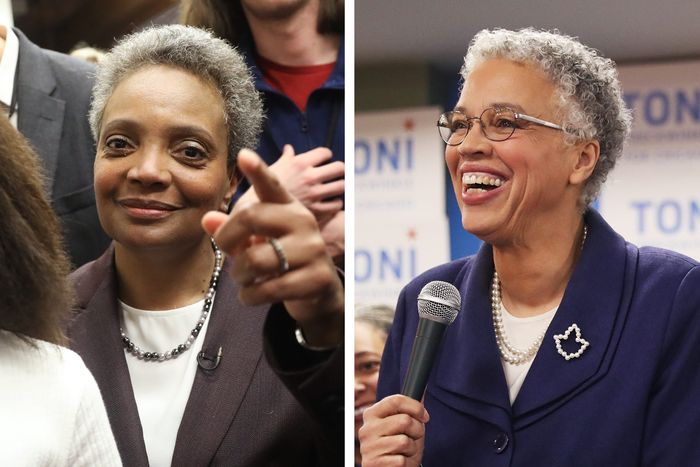
A very crowded Chicago mayoral field that aroused diminished public interest (turnout was near the record low of about one-third) nonetheless produced a historic result as two black women — former prosecutor Lori Lightfoot and Cook County Board president Toni Preckwinkle — finished first and second, with 17 and 16 percent, respectively. Both edged out the early favorite, former Commerce secretary and local royal family scion William Daley. They will meet in an April 2 runoff that will likely attract significantly higher turnout.
White men have held the Chicago mayor’s office for the last 32 years, most of it under Richard M. Daley (William’s brother) and Rahm Emanuel, whose surprise decision to retire after two terms created this turbulent election. So either outcome in the runoff will be historic. (Lightfoot’s might be adjudged as somewhat more historic in that she’s openly lesbian.) There are signs both candidates will accuse each other of being too close to the pro-business Democratic Establishment of the city exemplified by Emanuel and the Daleys.
Preckwinkle has been a fixture of local politics for many years, which won her high name ID and significant labor backing. But her candidacy was undoubtedly damaged by her association with Alderman Edward Burke, who has been the target of a major federal corruption investigation. She’s also responsible for a soda tax proposal that turned out to be very unpopular.
Lightfoot successfully positioned herself as a progressive reformer, and executed a late surge to make the runoff. But in a preview of the runoff campaign, Preckwinkle noted on election night that her opponent had worked for both Daley and Emanuel. Lightfoot’s bigger problem may be raising enough money for a tough campaign, though a big financial advantage didn’t do Bill Daley much good.
The New York Times offered a good, brisk summary of the problems the ultimate winner will face:
The city’s pension system will require an additional $1 billion in revenue by the end of the new mayor’s first term. Yet residents say they are weary from years of increases in their property tax bills and fees. Crime and gang violence remains a deep worry for many, even as the city contends with its long history of troubled relations between the police force and residents, especially in the black community.
And although tourism has boomed downtown, development along the Chicago River has flourished and corporations have flocked to the city in recent years, some neighborhoods on the South and West Sides have struggled with disinvestment, schools closing and people moving away.
Lightfoot in particular focused her campaign on claims of being a representative of the neighborhoods instead of “downtown,” and has considerable experience as an Emanuel appointee in examining corruption and racism in the police force. But Preckwinkle could inherit Establishment support to go with her own long-standing progressive claims. Endorsements by the 12 losing candidates — the third- through seventh-place finishers together won nearly half the total vote — could matter as well. But whatever happens, Chicago will turn a page in its rich political history.






























